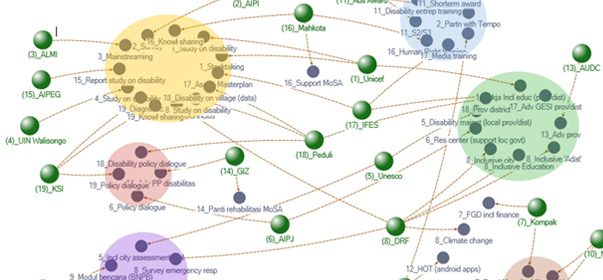Siti Ruhanawati
On 4 August 2017, KSI hosted the regular Development Partner Disability Coordination Meeting on the theme “Integrating Disability Dimensions in the Indonesian Knowledge Sector”, attended by 64 participants from 36 development partners, disabled people’sorganizations and research institutes.
In his opening remarks, KSI Team Leader Petrarca Karetji highlighted opportunities to mainstream and integrate social inclusion and disability into the Indonesian knowledge sector, including on improving the quality and accessibility of research, increased funding for disability research, improving the accuracy of andaccess to information and data, and deepening public discourse around disability.
In April 2016, the government approved Law 8/2016 on Disabilities. The first panel discussed the drafting of the Government Regulation (Rencana Peraturan Pemerintah/RPP), with speakers including Fajri Nursyamsi from Pusat Studi Hukum dan Kebijakan (PSHK), Rival Ahmad from Aliansi Riset Kebijakan Indonesia (ARK Indonesia) and Erlia Rachmawati, Head of Disability Empowerment, Coordinating Ministry of Human Development and Culture (Kemenko PMK). Law 8/2016 regulates 25 sectors of relevance for people with disabilities. This is highly complex and should not be operationalised into a single RPP, as proposed by the government. A coalition of NGOs has proposed a compromise of seven RPPs, based on the main focus areas in the Disability Law: Planning (Ministry of National Development Planning); Justice (Ministry of Law and Human Rights); Education, Labour Rights, Social Welfare, Accessibility of Public Services; and Incentives and Financing. Ibu Erlia from Kemenko PMK responded that the RPP is in the drafting process and is welcoming inputs formally through the Ministry of Social Affairs. No final decision on the number of PPs has been taken yet.
A second session on mainstreaming disability in universities was moderated by Prof.Irwanto from the University of Atma Jaya in Jakarta, with four speakers: Prof.Ocky Karnaradjasa from the Ministry of Research, Technology and Higher Education, Amich Alhumami from Bappenas, Muhrisun Afandi from the Disability Service Study Centre of UIN Sunan Kalijaga (Yogyakarta),and Slamet Tohari from the Centre for Disability Study and Service Centre of Brawijaya University (Malang). Prof.Ocky said that with a newly approved ministerial regulation (Permenristekdikti no.46/2017), universities are now obliged to provide equal opportunities to all students as well as to provide services for students with special needs, including people with a disability. The inclusiveness is not only around teaching, but also in research and community service. He proposed that criteria of disability services could be included as accreditation points.
In the last session, the 36 participating institutions provided brief updates on recent development and future plans. The results of the updates show the diversity of activities, the diversity of the disability sub-sector, the diversity of the scope of work, and the diversity of approaches undertaken by partners in addressing disability issues. The positive effect is that each partner knows what and howother partners are workingon the issue of disability.






